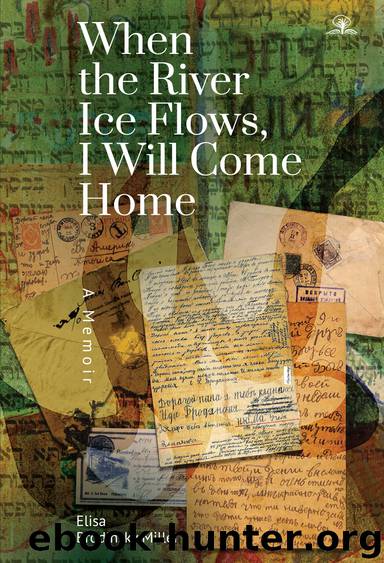When the River Ice Flows, I Will Come Home by Elisa Brodinsky Miller

Author:Elisa Brodinsky Miller
Language: eng
Format: epub
Publisher: Academic Studies Press
Published: 2020-04-02T00:00:00+00:00
Yet . . . yet . . . It was not that pogrom but one in 1920 that devastated Manya’s family. General Anton Denikin, Commander of the pro-Tsarist counter-revolutionary forces, and a base anti-Semite, was the instigator this time, according to family notes. Mokha writes (after letters resume) that it was this pogrom during the fall of 1920 that caused the family to flee. The military theatre around Kiev was the scene of a new development during the civil war year of 1920: Polish involvement. Forces seeking a national independent Ukraine joined with a newly established post-war Polish government to try to dislodge the hold the Bolsheviks had on Kiev that year and thus seize control. The Poles remembered the times of pre-partition Poland, before Catherine the Great kicked them out, when the rich Ukrainian farmlands were theirs. The Nationalist Ukrainians were willing to take their chances aligning with the Poles. In May, 1920, the Polish army was able to reach Kiev, but the victory was short-lived. The Poles soon retreated.
According to family notes I have, it was General Denikin, a fierce anti-Semite, who led a pogrom that destroyed the Jewish community of Gorodische. But I cannot be sure. Troop movements were many and complex. Soviet armies advancing, retreating. Polish armies advancing, retreating. By the fall of 1920, the Soviet Red Army was winning battles south of Kiev against the White (pro-Imperialist) armies now commanded by General Wrangel (who had replaced Denikin). Makhno, a powerful Cossack leader who had replaced Grigoriev, was now aiding the Bolsheviks in their fight against General Wrangel’s counter-revolutionary forces. Maybe Wrangel’s men “stopped” in Gorodische. Maybe the Soviets themselves stopped in Gorodische. Maybe it was Makhno’s men. The Cossack Makhno had been fighting on the side of the Red Army but that relationship turned sour and the Red Army was now declaring this man their enemy. Makhno, peeved, irritable and volatile might well have provoked his men to take “revenge”—of any kind.
It could have been the Red Army Cavalry, it could have been an errant peasant militia, it could have been another regiment of the Soviet Armed Forces (even with Jewish soldiers), it could have been retreating Poles, it could have been a group of pro-Tsarist Whites now under General Wrangel. But we know that Manya’s flight was sudden and ill-prepared. Mokha writes from the city of Gomel, “We are spread everywhere, and we cannot help each other.” Veniamin writes from the city of Kiev, “We are hungry, cold, barefoot.”
I know the family left Gorodische just as the pogromschiks were burning all the Jewish houses in Gorodische. I know because my father told that story in an essay he wrote about how their escape was interrupted because his mother needed to go back to the fiery scene in order to retrieve her ketubah. Her ketubah which I now have.
Am I the appointed caretaker of our family history?
So the meaning of a memory finally becomes clear. My father and I are standing on the second floor
Download
This site does not store any files on its server. We only index and link to content provided by other sites. Please contact the content providers to delete copyright contents if any and email us, we'll remove relevant links or contents immediately.
| Civilization & Culture | Expeditions & Discoveries |
| Jewish | Maritime History & Piracy |
| Religious | Slavery & Emancipation |
| Women in History |
Cecilia; Or, Memoirs of an Heiress — Volume 1 by Fanny Burney(32558)
Cecilia; Or, Memoirs of an Heiress — Volume 2 by Fanny Burney(31956)
Cecilia; Or, Memoirs of an Heiress — Volume 3 by Fanny Burney(31941)
The Secret History by Donna Tartt(19085)
Sapiens: A Brief History of Humankind by Yuval Noah Harari(14389)
Leonardo da Vinci by Walter Isaacson(13336)
The Radium Girls by Kate Moore(12028)
Sapiens by Yuval Noah Harari(5369)
How Democracies Die by Steven Levitsky & Daniel Ziblatt(5218)
The Wind in My Hair by Masih Alinejad(5095)
Homo Deus: A Brief History of Tomorrow by Yuval Noah Harari(4918)
Endurance: Shackleton's Incredible Voyage by Alfred Lansing(4780)
Man's Search for Meaning by Viktor Frankl(4605)
The Silk Roads by Peter Frankopan(4533)
Millionaire: The Philanderer, Gambler, and Duelist Who Invented Modern Finance by Janet Gleeson(4478)
The Rape of Nanking by Iris Chang(4211)
Joan of Arc by Mary Gordon(4109)
The Motorcycle Diaries by Ernesto Che Guevara(4098)
Stalin by Stephen Kotkin(3965)
